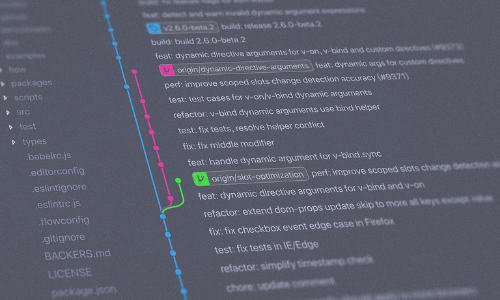
Being a developer is a lot more than your ability to write code.
Along with having technical skills also comes the requirement to manage yourself, be organised and structured in how you approach your tasks.
There are some simple and effective organisation tips for developers that will improve your ability to be more efficient at performing your day to day activities.
Using both developer focused and general tools for organisation can be used to improve how to manage your work. Having the right mindset is also important, and placing a more conscious effort to improve how you organise yourself will go a long way.
Let’s go through some simple and effective organisation tips for developers that should be useful for anyone who wants to improve their efficiency in how they approach tasks.
1. Use version control

Version control tools allow you to save, revert and track changes to your source code. Having some sort of source code versioning system in place has become an expectation as part of good software development practices.
The most popular versioning control system is git, and is widely used to manage projects from individual to company level.
Perhaps seen as one of the most basic developer tools everyone should have in place, using source control is an essential minimum when it comes to being an organised developer.
Not only does source control make things easier for you to manage your code base, it’s also an extremely valuable tool to have for debugging purposes or when working on code with a team.
With a team, using version control is crucial in ensuring all individual contributions can be effectively tracked, managed and combined into the same code base. In cases like these, the use of a source control hosting platform such as GitHub will provide a central remote location of your repositories while also acting as a cloud based backup for your source files.
Additionally, when it comes to using version control, use it to manage all the work you do and not just your essential code base. Whether for production code, temporary code or documentation, applying version control to all your files will keep your projects organised and make things easier for yourself in the future.
2. Take time to plan and document

Having some form of a plan is an obvious factor when it comes to the topic of organisation but not one that’s always applied in practice!
With each task you’re about to undertake, have a rough idea of why you’re working on the task and what you hope to achieve. Or even better, plan out your tasks and have a detailed outline or workflow of how you’ll approach each one.
For example, if you’re starting out a new development project, an outline of the key milestones and steps to take to get there can be the starting point of outlining your action plan.
Having documentation in place for your projects and tasks is also important for organisation. Documents act as a form of communication that can convey important information relating to any activity or project.
The task of writing up documentation tends to be a dreaded activity for some developers but documents are there for a reason. They ensure you can keep track of your work while also making it easier for your future-self to pick up on the project after leaving it for a long time.
If you’re working with a team, documentation is even more important in providing the ability for members to collaborate effectively.
Documentation can come in the form of a project plan, requirements, setup instructions, bug reports, software flow description or the repo documents such as the README file.
Taking the time to plan, document and develop some form of process on how you’ll handle tasks will only work towards your advantage. It acts as a reference and will save you time, allow you and your team to easily approach a similar task that comes up in the future.
Out of all these organisation tips for developers it may easy to disregard this point but don’t underestimate the importance of documentation!
3. Have a go-to location for your files

Everyone does things differently when it comes to how they manage their project files. What’s important is having a set location that you’re used to for accessing your important files.
Whether your files are stored on your computer locally or on a cloud location or both, make sure you have a dedicated place where you know you’ll find all your important files.
Similar to having real physical files and folders, it makes sense if there’s a known place for everything.
4. Consider using a project management platform

Developers naturally work with the concept of projects and any development task we approach can be treated as one.
Using a project management platform that provides a set of features focused on applying management concepts will give you even better control over your tasks and enable you to become more organised.
I recommend Trello for as a project management tool suitable for tracking development work. Trello is an online task management platform that uses the concepts of having digital sticky notes on a board to visualise and arrange your work.
Using a tool like Trello allows you to outline your project plans, create checklists, plan out workflows, apply deadlines, highlight critical tasks or any other piece of activity involved in managing projects.
Check out our article on using Trello to organise your dev projects for more information on using Trello effectively as a developer.

From a developer perspective, project management tools can act as a centralised location for you to map out all activities related to your development work. These can include dev workflows, feature lists, bug tracking, test plans and so on.
There are many ways you’ll find yourself being more organised simply by committing to using a project management platform.
Although it takes some initial extra effort to set up and get used to such platforms, it’s a worthy investment of your time and will only make things easier for yourself going forward.
5. Learn to be consistent

Approaches to certain tasks or procedures may differ slightly between individuals but the most important thing to be consistent with the things you can control.
This can involve things like the naming conventions do you use in your code. For example if you’re working on two different projects both using C programming, don’t use camelCase to name variables for one project and snake_case for another.
Consistency is key here in having some level of well grounded organisation to your work.
Not being consistent in your structure and processes may cause disorganisation that may not be obvious at the start. As your project scales or as your team grows, that’s when the consequences of inconsistency will be revealed.
Consistency = Pattern = Structure = Organisation.
While working with a team, consistency means things can be more easily handed over to others and also helps with documentation processes. Ideally in team situations, a document should be created at the start of a project that outlines standards and procedures to be followed collectively by the team.
Being consistent allows for tidiness, searchability and avoidance of confusion.
The concept of consistency can be a simple mindset shift for some or might take more practice to get used to for others. Either way, learn to adapt consistency as it’s an effective method of greatly improving your general level of organisation.
Conclusion
We’ve covered simple and effective organisation tips for developers that when applied should help you become more efficient at tackling your tasks.
Explore tools and processes that work for you and use them to assist where necessary. Learning to stay organised appears mundane and the benefits might not be obvious at the start.
However, don’t underestimate the value of these organisation tips for developers. While extremely straightforward and simplistic, if taken seriously, overtime you’ll vastly improve your ability to be more organised.
Do you have any more organisation tips for developers to share? Are you already applying any of these tips? Comment below!
Did you find this article useful? Also checkout other articles on developer tips: